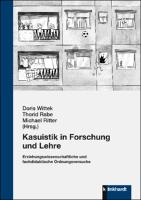Kasuistik in Forschung und Lehre
Erziehungswissenschaftliche und fachdidaktische Ordnungsversuche
Contributor(s)
Wittek, Doris (editor)
Rabe, Thorid (editor)
Ritter, Michael (editor)
Language
GermanAbstract
Case studies are currently gaining scientific attention, not only, but especially in teacher education. With the help of casuistry, according to the programmatic expectation, the students will be able to realise for their later professional action that stocks of professional routine knowledge and theoretical-reflective knowledge have to be put into practice again and again in case-sensitive and situation-sensitive constellations. The present volume attempts to question the now diversified field of casuistic research and teaching in the field of educational science and subject didactics with regard to its inherent structures and orders. It is not a question of the final clarification of the field of casuistry, but rather of a structuring inventory, which aims to relate existing approaches and schools of casuistry conceptually and concretely with regard to their practices and, especially in the differences, to identify common orientations as well as the diverse potentials of research and teaching in the case. Die Kasuistik befindet derzeit im Aufwind der wissenschaftlichen Aufmerksamkeit, nicht nur, aber insbesondere in der Lehrer*innenbildung. Mithilfe der Kasuistik, so die programmatische Erwartung, können die Studierenden für ihr späteres professionelles Handeln erkennen, dass Bestände des beruflichen Routinewissens und des theoretisch-reflexiven Wissens in fall- und situationssensiblen Konstellationen immer wieder aufs Neue praktisch ins Verhältnis gesetzt werden müssen. Der vorliegende Band versucht das inzwischen diversifizierte Feld kasuistischen Forschens und Lehrens im Bereich der Erziehungswissenschaft und der Fachdidaktiken auf ihm inhärente Strukturen und Ordnungen hin zu befragen. Es geht dabei nicht um die abschließende Klärung des Feldes der Kasuistik, sondern um eine strukturierende Bestandsaufnahme, die bestehende Ansätze und Schulen der Kasuistik konzeptionell und konkret im Hinblick auf ihre Praxen miteinander in Beziehung setzen und gerade in den Differenzen die gemeinsamen Orientierungen, wie auch die diversen Potenziale von Forschung und Lehre am Fall herausarbeiten möchte. (DIPF/Orig.)


 Download
Download Web Shop
Web Shop